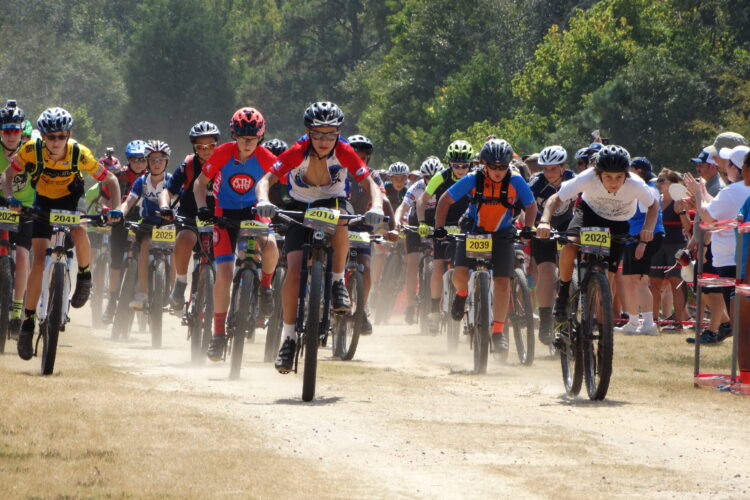
Jason Halverson had worked in the bike industry for years before his daughter began competing in high school mountain biking. Considering NICA’s rules on course design and that many kids were racing on bikes that are less-than-ideal for the course conditions, Halverson recognized an open space for a brand and an idea he’d long entertained.
“It seemed like a lot of kids were either unaware of the bike they needed or didn’t have the resources to get a competitive bike,” said Halverson. Students often raced on a parent’s hand-me-down bike, heavy with with clunky gearing or their one, big full-suspension bike they use for everything.
A lot of brands tell consumers they created the bikes the owners wanted to ride, but for Halverson, Jibe Cycleworks started as a brand for student athletes in a still expensive sport with lightning-fast growth. Today, they have one frame, a lightweight carbon hardtail, offered in four different build options.
The most affordable competition build has a 1×12 Shimano Deore groupset and a RockShox Judy 120mm fork and weighs under 27lb. It costs $1,999. The highest-end build gets a Shimano XTR groupset, a 120mm Fox fork and Fox dropper post, carbon handlebars, and custom carbon wheels. It weighs under 23lbs and costs $5,300. A Jibe XCHT carbon fiber frame costs $900.

Jibe officially launched in 2022, but Halverson has been developing the brand since 2019, sourcing frames from Asia. The first bikes came in 2020 and were being sold through a local shop in Salt Lake City that Halverson had a relationship with. The frames use an open mold design, but like other companies who use open molds, Jibe can adjust aspects of the design like the carbon layup or where the cables are routed.
His vision for the bike was to be competitive with other carbon hardtails on the market which have modern XC racing geometry, Boost axle spacing, and great components. Flattened seat stays give the frame better compliance and ride quality, and a wide bottom bracket and head tube give it increased stiffness against torsion from pedaling. A medium frame weighs 2.5lbs and comes with a seven-year warranty.
The geometry is a mix of classic XC measurements, like a shorter wheelbase, lower stack height, and a steeper head tube angle, with a slightly longer reach. The bikes fit anyone from 4’10” to 6’6″.
As a former product manager for GT Bikes and Cannondale, Halverson knew what kinds of components he wanted on the bikes. The bikes are mostly specced with parts from RockShox, Fox, Shimano, and Maxxis. Even if the athletes aren’t really familiar with the world of mountain biking, they’ll be able to identify some of the brands on a Jibe.
“We just wanted to give them a full package of something that, if they did do a little research, they would feel confident this is pretty well known stuff.”

During Halverson’s tenure in the bike industry, he’s owned Staats BMX bikes for eight years, worked for GT and Cannondale for four years, and worked for Shimano for four years. When GT and Cannondale merged, Halverson took on a role as a BMX product manager, designing BMX frames, working on the mountain bike line, and managing parts specs on 30-40 bikes per year. In 2014, he went to work for Shimano as an OEM sales manager handling accounts for Yeti, Pivot, Santa Cruz, and Ibis, learning the ins and outs for sourcing components. One of his biggest takeaways as a product manager was not choosing parts that he liked, but staying with market demand.
“You have to be really disciplined to not look at what I like, but what the market likes.”
Jibe’s branding was equally important though, explained Halverson and the decision again was less about him. Ultimately, Jibe’s image is not one he would have chosen himself, but something that seems to resonate with high school mountain bikers so far. The colors, lettering, and badging are cool and subtle and he says kids dig it so far. The bikes come in a light grey with small flourescent yellow accents or a dark grey color with subdued grey lettering. The neutral colors are easily accessorized with a school’s colors and shouldn’t clash with a team kit.
Now that the hardtail is dialed, Jibe is selling a few bikes per week, a good pace for a new company. Next up, they plan to release a fat bike for winter conditioning. There are plenty of groomed trails around Salt Lake City and Park City, Halverson said. They’re also working on a full-suspension model, which could be for XC racing or an all-around trail bike, and Jibe plans to release a gravel bike too.
He sees Jibe evolving with its riders. Maybe they start with the hardtail and decide after a while they want a full-suspension bike or a gravel bike to ride too. When someone buys a Jibe, they’re encouraged to send in photos or results. Halverson said he’s continuously hearing about kids who upgrade from an older bike to a Jibe and see their placement boosted at the end of a race.
“I’m talking to all these dads every day. Mom’s calling me telling me how their kids did. They’re all excited,” he said.
These stories and anecdotes are a reminder of how Jibe is far more than a job to him.
“It’s fun for me to see the improvement and the excitement increase from these riders after getting on a Jibe,” he said. “It makes me feel like I’m not just doing a business, I’m actually kind of a part of the community and helping these kids really get out of mountain biking what us people who have been in it for years can take for granted, or the real core reason we’re in it, which is having fun and improving your results.”




















